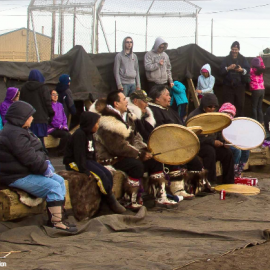An Arctic Vision
-
English
-
ListenPause
I’m Peter Neill, Director of the World Ocean Observatory. In the past five editions of World Ocean Radio I have presented the a survey of the discussions and plans among national governments and other parties interested in the parameters of development and governance of the Arctic region. Reference throughout has been made to the economic and social needs of the indigenous Arctic population, the existence of which separates the Arctic deliberations from the well-established Antarctic agreements that preclude all such exploitative activities completely. The United States has the chair of the Arctic Council for the next two years, and in last week’s edition I voiced some optimism for its published agenda while retaining real concern over the assumption that the Arctic would be “developed,” that the conventional interests were to be somehow accommodated, and that some consensus compromise was possible, enabling multiple forces that are fundamentally contradictory. In the meantime, one of the major Arctic nations, Canada, has had an election resulting in an astonishing reversal of many policies asserted by the prior government. Just a few weeks ago, before the opening of the Climate Summit in Paris, the new Canadian Premier, Justin Trudeau, issued a series of stunning reversals in national policy regarding oil and gas and regarding response to the pressing climate issues to be addressed at the meeting. In his remarks, Trudeau acknowledged the impact of climate change on Canada, with special dramatic affect on the Arctic region and indicated that he saw an opportunity to build a sustainable economy based on clean technology, on green infrastructure, and on green jobs.” He continued: “Indigenous people have known for thousands of years how to care for the planet. The rest of us have a lot to learn and no time to waste.” If that is the case, and if the viability of those people and their communities is truly the goal of the Arctic Council, how might that knowledge be applied toward a new Arctic vision based not on the old assumptions but on the new application of sustainable engagement with the land, transformed into practice, employment, and community benefit for the people who live there? How would that indigenous knowledge become manifest in a 21st century iteration of the sustainable economy Trudeau envisions? Lets look at three areas where a different approach might succeed. First, fishing. There is no certainty that the fishery resources of the Arctic will increase as a result of over-fishing elsewhere. There is an argument for small-scale fishing, limited to sustainable quotas, employing local people, permitting the Arctic region to serve as an incubator for fishery recovery, while making a local contribution to the indigenous economy where sustainable fishing is a long tradition. Further, there is a significant aquaculture opportunity in the Arctic, emerging as an expression of technological innovation and more efficient use of all fishery products that could be a financial success at appropriate scale. The construction, operation, and maintenance of these activities will require local, skilled employees. Second, shipping. Today the Northwest and Northeast passages are still only marginally viable as a safe and consistent shipping routes with major impact on the transportation costs of east-west trade. That might change, and if so, those ships will need crews, land support, navigation and rescue services, and emergency response to environmental accident. Those same routes may also serve underwater cables for communications, requiring management and repair skills, again an interesting opening for new employment. Third, energy. The withdrawal of Shell from its Arctic drilling experiment has demonstrated that conventional energy extraction may be too dangerous and expensive to be profitable. But what about geo-thermal energy and solar, again at scale, but nonetheless at a level that will support community living in a harsh environment and provide jobs and support services that are critically lacking today and undermine the social welfare of the inhabitants who have not historically shared in the return from energy extracted from Arctic waters? Trudeau’s statements at least suggest that such a new vision might actually be supported and applied in the Canadian Arctic. Iceland, where Arctic consciousness and leadership is high, is an example of a small nation that has applied its own version of sustainability to its natural resources at invented a community, indeed a nation that shows that such premises and innovations can succeed. The characteristics of success in the Arctic are as follows: imagination, utility, simplicity, resilience, community concern, and actions commensurate to local scale and needs sustainable over time. These qualities are not just an Arctic vision, but can sustain us everywhere in every community, if we will dare to accept and apply them as a new vision for us all. We will discuss these issues, and more, in future editions of World Ocean Radio.
The Arctic conversation concludes this week with "An Arctic Vision." In this episode, host Peter Neill focuses on the indigenous Arctic community and how a sustainable economy might be developed based on new policies, practices, employment opportunities, and benefits for the people who live there. And he outlines three key areas in which a sustainable approach might succeed in the Arctic: fishing, shipping, and energy.
About World Ocean Radio
Peter Neill, Director of the World Ocean Observatory and host of World Ocean Radio, provides coverage of a broad spectrum of ocean issues from science and education to advocacy and exemplary projects. World Ocean Radio, a project of the World Ocean Observatory, is a weekly series of five-minute audio essays available for syndicated use at no cost by college and community radio stations worldwide. A selection of episodes is now available in Portuguese, Spanish, French, Swahili, and Mandarin, enabling us to reach 75% of the world's population. For more information, visit WorldOceanObservatory.org/world-ocean-radio-global.
Image
J. London, NOAA
Follow the #ArcticFuture conversation on Twitter.
- Login to post comments



